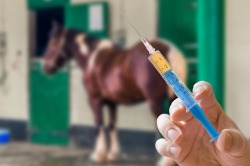BEVA has welcomed the news that the Veterinary Medicines Directorate (VMD) has relaxed its recently imposed restrictions on the sale of the essential equine pain killer, flunixin by allowing the release of stock from manufacturers. This action will, in the short term, restore access to this medicine for use in non-food producing horses.
Jon Pycock, BEVA President noted: “It remains a concern to BEVA that this mechanism was not put in place before the suspension of flunixin was imposed. Contrary to assertions by the VMD, wholesalers were unable to meet the demands of the veterinary profession and clinical use of this medicine was disrupted within 24 hours of the VMD’s initial announcement. We are surprised by the Regulator’s lack of awareness of availability in the supply chain and question why there was no consultation with the veterinary sector before the suspension was enacted. The VMD has been aware of this issue since March 2018 and it appears that no contingency was put in place to consider the animal welfare impact of this decision until it was too late.”
BEVA Junior Vice President and Specialist in Equine Surgery Tim Mair continued: “Flunixin is a unique medicine in managing pain and sepsis in horses with colic. The VMD appeared to believe that this medicine could be substituted for other veterinary medicines and this is simply not the case. The release of stock from manufacturers is a short-term solution and, looking forward, we would like assurances that the VMD will fast track applications for the modification of product licenses to ensure that equine vets have continued access to these products.”
Professor Kate White, Senior Vice President of the Association of Veterinary Anaesthetists added: “provision of pain relief is essential to maintain animal welfare. The loss of these products would hinder the work of vets working with horses and donkeys and in zoos where they are first line drugs for the management of pain. Use of flunixin in these animals can be undertaken safely with no impact on human health.”
Stock of flunixin held by manufacturers will be distributed alongside a ‘caution in use’ letter that will explain the restricted use of this product. BEVA is reminding all equine vets that the horse’s food chain status must be checked when using this product – either using the paper passport or the recently launched chip checker on the central equine database website.












